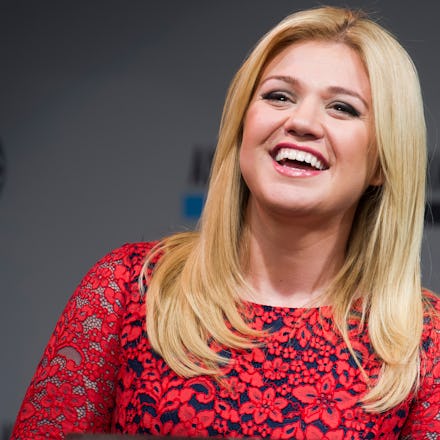Kelly Clarkson Disappointed Feminist Fans But She'll Always Be a Feminist Icon to Me

I’ll never forget where I was the first time I heard Kelly Clarkson’s 2003 hit single, "Miss Independent."
Back in the days when MTV featured actual music on their channel, I’d sit on my couch and do homework with the week’s most popular music videos playing in the background. It only took one time for me to hear the lyrics — "Miss Independent, Miss self-sufficient, Miss keep your distance/Miss unafraid, miss outta-my-way, Miss don't let a man interfere."
I became obsessed.
I sang it in the shower, shared it with friends on homemade mix CDs, and even used it for a class project. "This song reminds me of you, Krystie," my seventh-grade English teacher told me, and I took it as the highest compliment.
Years before I read feminist theorists like bell hooks, supported equal rights legislation, or voted in national elections, I was inherently influenced by the pop culture around me. For better or worse — and regardless of the singer’s intentions — some of my first lessons in female empowerment and independence came from Kelly Clarkson.
But in a recent interview with Time magazine, the pop star and American Idol alum explained that she doesn’t identify as a feminist.
"I wouldn’t say [I'm a] feminist, that’s too strong. I think when people hear 'feminist' it’s just like, 'Get out of my way I don’t need anyone,'" she said. "I love that I’m being taken care of, and I have a man that’s an actual leader. I’m not a feminist in that sense."
In response, a number of media outlets decided to tell Clarkson that she was wrong about herself and, as it turns out, she actually is a feminist. Last April, Beyonce was similarly criticized when she also said in an interview that she wouldn’t call herself a feminist.
Of course I would love for Kelly Clarkson to call herself a feminist and reject the negative stereotypes that come along with the label, instead of feeding into them. But should it really be the goal of other feminists to berate and bully pop stars into identifying with the label?
The public doesn’t get to decide if Kelly Clarkson, or anyone else for that matter, is or isn't a feminist. While that may be disappointing, and we may disagree with her understanding, we don't get to decide the personal politics of others.
It’s not up to us to dictate who should feel comfortable identifying with feminism and why. We can, however, still interpret her messages, lyrics, and actions in our own, individual ways.
The reality is, Clarkson’s self-identification (or lack thereof) doesn't change my experience as a 13-year-old girl coming into her own and being positively impacted by her music. It also doesn’t diminish her ability to influence an entire generation of female and male listeners who rock out to her music with inherently feminist messages. (Put a group of 20-something females in a room, play "Since You’ve Been Gone" at the loudest possible volume, and you’ll see what I’m talking about.)
Regardless of whether she calls herself a feminist, Clarkson’s music played a role in shaping my own feminist consciousness. Ambivalence about a word doesn't necessarily equate with an inability to embody its meaning.